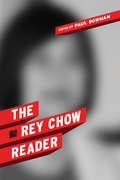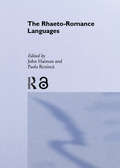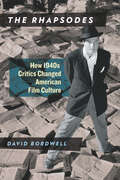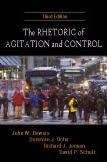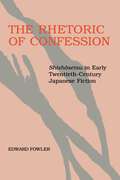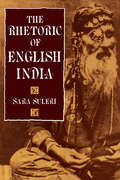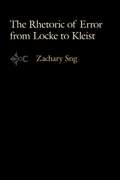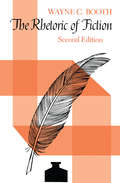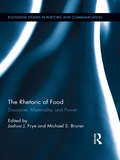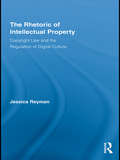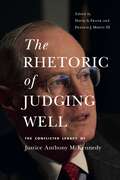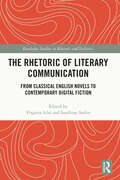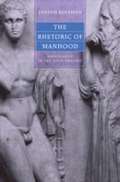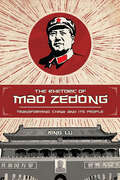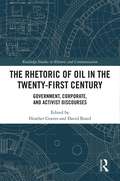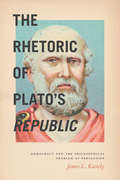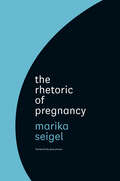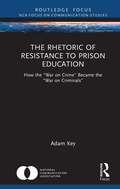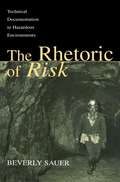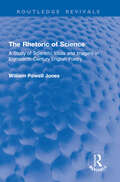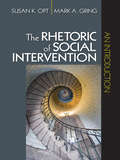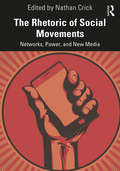- Table View
- List View
The Rey Chow Reader
by Rey ChowRey Chow is arguably one of the most prominent intellectuals working in the humanities today. Characteristically confronting both entrenched and emergent issues in the interlocking fields of literature, film and visual studies, sexuality and gender, postcolonialism, ethnicity, and cross-cultural politics, her works produce surprising connections among divergent topics at the same time as they compel us to think through the ethical and political ramifications of our academic, epistemic, and cultural practices. This anthology - the first to collect key moments in Chow's engaging thought - provides readers with an ideal introduction to some of her most forceful theoretical explorations. Organized into two sections, each of which begins with a brief statement designed to establish linkages among various discursive fields through Chow's writings, the anthology also contains an extensive Editor's Introduction, which situates Chow's work in the context of contemporary critical debates. For all those pursuing transnational cultural theory and cultural studies, this book is an essential resource.
The Rhaeto-Romance Languages (Romance Linguistics)
by John Haiman Paola BenincaThe Rhaeto-Romance languages have been known as such to the linguistic community since the pioneering studies of Ascoli and Gartner over a century ago. There has never been a community of RR speakers based on a common history or polity and the various dialects are mutually unintelligible, but a unity, based on a number of common features, has been advanced. This book is the first general description of the Rhaeto-Romance languages to be written in English. It provides a critical examination of the phonology, morphology, lexicon, and syntax of the modern Rhaeto-Romance dialects within the broader perspective of Romance comparative linguistics.
The Rhapsodes: How 1940s Critics Changed American Film Culture
by David BordwellPauline Kael, Andrew Sarris, and Roger Ebert were three of America's most revered and widely read film critics, more famous than many of the movies they wrote about. But their remarkable contributions to the burgeoning American film criticism of the 1960s and beyond were deeply influenced by four earlier critics: Otis Ferguson, James Agee, Manny Farber, and Parker Tyler. Throughout the 1930s and '40s, Ferguson, Agee, Farber, and Tyler scrutinized what was on the screen with an intensity not previously seen in popular reviewing. Although largely ignored by the arts media of the day, they honed the sort of serious discussion of films that would be made popular decades later by Kael, Sarris, Ebert and their contemporaries. With The Rhapsodes, renowned film scholar and critic David Bordwell--an heir to both those legacies--restores to a wider audience the work of Ferguson, Agee, Farber, and Tyler, critics he calls the "Rhapsodes" for the passionate and deliberately offbeat nature of their vernacular prose. Each broke with prevailing currents in criticism in order to find new ways to talk about the popular films that contemporaries often saw at best as trivial, at worst as a betrayal of art. Ferguson saw in Hollywood an engaging, adroit mode of popular storytelling. Agee sought in cinema the lyrical epiphanies found in romantic poetry. Farber, trained as a painter, brought a pictorial intelligence to bear on film. A surrealist, Tyler treated classic Hollywood as a collective hallucination that invited both audience and critic to find moments of subversive pleasure. With his customary clarity and brio, Bordwell takes readers through the relevant cultural and critical landscape and considers the critics' writing styles, their conceptions of films, and their quarrels. He concludes by examining the profound impact of Ferguson, Agee, Farber, and Tyler on later generations of film writers. The Rhapsodes allows readers to rediscover these remarkable critics who broke with convention to capture what they found moving, artful, or disappointing in classic Hollywood cinema and explores their robust--and continuing--influence.
The Rhetoric Of Agitation And Control
by John W. Bowers Donovan J. Ochs Richard J. Jensen David P. SchulzThe Rhetoric of Agitation and Control provides a framework for the study of agitation and responses to that agitation. The third edition offers a profile of past and current movements, such as the street theatre of Chicago in 1968 and the innovative and technological rhetorical techniques found in the Battle in Seattle. The modus operandi of today's protests continues to evolve from that of the 1960s and 1970s.
The Rhetoric of Confession: <i>Shishosetsu</i> in Early Twentieth-Century Japanese Fiction
by Edward FowlerThe shishosetsu is a Japanese form of autobiographical fiction that flourished during the first two decades of this century. Focusing on the works of Chikamatsu Shuko, Shiga Naoya, and Kasai Zenzo, Edward Fowler explores the complex and paradoxical nature of shishosetsu, and discusses its linguistic, literary and cultural contexts.
The Rhetoric of Diversion in English Literature and Culture, 1690–1760
by Darryl P. DomingoWhy did eighteenth-century writers employ digression as a literary form of diversion, and how did their readers come to enjoy linguistic and textual devices that self-consciously disrupt the reading experience? Darryl P. Domingo answers these questions through an examination of the formative period in the commercialization of leisure in England, and the coincidental coming of age of literary self-consciousness in works published between approximately 1690 and 1760. During this period, commercial entertainers tested out new ways of gratifying a public increasingly eager for amusement, while professional writers explored the rhetorical possibilities of intrusion, obstruction, and interruption through their characteristic use of devices like digression. Such devices adopt similar forms and fulfil similar functions in literature as do diversions in culture: they 'unbend the mind' and reveal the complex reciprocity between commercialized leisure and commercial literature in the age of Swift, Pope, and Fielding.
The Rhetoric of English India
by Sara SuleriTracing a genealogy of colonial discourse, Suleri focuses on paradigmatic moments in the multiple stories generated by the British colonization of the Indian subcontinent. Both the literature of imperialism and its postcolonial aftermath emerge here as a series of guilty transactions between two cultures that are equally evasive and uncertain of their own authority. "A dense, witty, and richly allusive book . . . an extremely valuable contribution to postcolonial cultural studies as well as to the whole area of literary criticism. "--Jean Sudrann, Choice
The Rhetoric of English India
by Sara SuleriTracing a genealogy of colonial discourse, Suleri focuses on paradigmatic moments in the multiple stories generated by the British colonization of the Indian subcontinent. Both the literature of imperialism and its postcolonial aftermath emerge here as a series of guilty transactions between two cultures that are equally evasive and uncertain of their own authority. "A dense, witty, and richly allusive book . . . an extremely valuable contribution to postcolonial cultural studies as well as to the whole area of literary criticism."—Jean Sudrann, Choice
The Rhetoric of Error from Locke to Kleist
by Zachary SngSng focuses on literary and philosophical accounts of the relationship between language and thought. Rather than approaching its topic conceptually or historically, he takes on canonical texts of the Enlightenment and Romanticism and engages with their rhetorical strategies.
The Rhetoric of Fiction
by Wayne C. BoothThe first edition of The Rhetoric of Fiction transformed the criticism of fiction and soon became a classic in the field. One of the most widely used texts in fiction courses, it is a standard reference point in advanced discussions of how fictional form works, how authors make novels accessible, and how readers recreate texts, and its concepts and terms—such as "the implied author," "the postulated reader," and "the unreliable narrator"—have become part of the standard critical lexicon. For this new edition, Wayne C. Booth has written an extensive Afterword in which he clarifies misunderstandings, corrects what he now views as errors, and sets forth his own recent thinking about the rhetoric of fiction. The other new feature is a Supplementary Bibliography, prepared by James Phelan in consultation with the author, which lists the important critical works of the past twenty years—two decades that Booth describes as "the richest in the history of the subject."
The Rhetoric of Fiction: Second Edition
by Wayne C. BoothThe first edition of The Rhetoric of Fiction transformed the criticism of fiction and soon became a classic in the field. One of the most widely used texts in fiction courses, it is a standard reference point in advanced discussions of how fictional form works, how authors make novels accessible, and how readers recreate texts, and its concepts and terms—such as "the implied author," "the postulated reader," and "the unreliable narrator"—have become part of the standard critical lexicon. For this new edition, Wayne C. Booth has written an extensive Afterword in which he clarifies misunderstandings, corrects what he now views as errors, and sets forth his own recent thinking about the rhetoric of fiction. The other new feature is a Supplementary Bibliography, prepared by James Phelan in consultation with the author, which lists the important critical works of the past twenty years—two decades that Booth describes as "the richest in the history of the subject. "
The Rhetoric of Food: Discourse, Materiality, and Power (Routledge Studies in Rhetoric and Communication)
by Joshua J. Frye Michael S. BrunerThis book focuses on the rhetoric of food and the power dimensions that intersect this most fundamental but increasingly popular area of ideology and practice, including politics, culture, lifestyle, identity, advertising, environment, and economy. The essays visit a rich variety of dominant discourses and material practices through a range of media, channels, and settings including the White House, social movement rhetoric, televisual programming, urban gardens, farmers markets, domestic and international agriculture institutions, and popular culture. Rhetoricians address the cultural, political, and ecological motives and consequences of humans’ strategic symbolizing and attendant choice-making, visiting discourses and practices that have impact on our species in their producing, distributing, regulating, marketing, packaging, consuming, and talking about food. The essays in this book are representative of dominant and marginal discourses as well as perennial issues surrounding the rhetoric of food and include macro-, meso-, and micro-level analyses and case studies, from international neoliberal trade policies to media and social movement discourse to small group and interactional dynamics. This volume provides an excellent range and critical illumination of rhetoric’s role as both instrumental and constitutive force in food representations, and its symbolic and material effects.
The Rhetoric of Intellectual Property: Copyright Law and the Regulation of Digital Culture (Routledge Studies In Rhetoric And Communication Ser. #3)
by Jessica ReymanIn recent years we have witnessed a rising tension between the open architecture of the Internet and legal restrictions for online activities. The impact of digital recording technologies and distributed file sharing systems has forever changed the expectations of everyday users with regard to digital information. At the same time, however, U.S. Copyright Law has shown a decided trend toward more restrictions over what we are able to do with digital materials. As a result, a gap has emerged between the reality of copyright law and the social reality of our everyday activities. Through an analysis of the competing rhetorical frameworks about copyright regulation in a digital age, this book shows how the stories told by active parties in the debate shape our cultural understanding of what is and is not acceptable in the use of copyrighted works on digital networks. Reyman posits recent legal developments as sites of conflict between competing value systems in our culture: one of control, relying heavily on comparisons of intellectual property to physical property, and emphasizing ownership, theft, and piracy, and the other a value of community, implementing new concepts such as that of an intellectual "commons," and emphasizing exchange, collaboration, and responsibility to a public good.
The Rhetoric of Judging Well: The Conflicted Legacy of Justice Anthony M. Kennedy (Rhetoric and Democratic Deliberation)
by David A. Frank And Francis J. Mootz IIIKnown as the “swing justice,” Justice Anthony M. Kennedy provided the key vote determining which way the Supreme Court would decide on some of the most controversial cases in US history. Though criticized for his unpredictable rulings, Kennedy also gained a reputation for his opinion writing and, more so, for his legal rhetoric.This book examines Justice Kennedy’s legacy through the lenses of rhetoric, linguistics, and constitutional law. Essays analyze Kennedy’s opinion writing in landmark cases such as Romer v. Evans, Obergefell v. Hodges, and Planned Parenthood v. Casey. Using the Justice’s rhetoric as an entry point into his legal philosophy, this volume reveals Kennedy as a justice with contradictions and blind spots—especially on race, women’s rights, and immigration—but also as a man of empathy deeply committed to American citizenship.A sophisticated assessment of Justice Kennedy’s jurisprudence, this book provides new insight into Kennedy’s legacy on the Court and into the role that rhetoric plays in judging and in communicating judgment.In addition to the editors, the contributors to this volume are Ashutosh Bhagwat, Elizabeth C. Britt, Martin Camper, Michael Gagarin, James A. Gardner, Eugene Garver, Leslie Gielow Jacobs, Sean Patrick O’Rourke, Susan E. Provenzano, Clarke Rountree, Leticia M. Saucedo, Darien Shanske, Kathryn Stanchi, and Rebecca E. Zietlow.
The Rhetoric of Literary Communication: From Classical English Novels to Contemporary Digital Fiction (Routledge Studies in Rhetoric and Stylistics)
by Sandrine Sorlin Virginie IchéBuilding on the notion of fiction as communicative act, this collection brings together an interdisciplinary range of scholars to examine the evolving relationship between authors and readers in fictional works from 18th-century English novels through to contemporary digital fiction. The book showcases a diverse range of contributions from scholars in stylistics, rhetoric, pragmatics, and literary studies to offer new ways of looking at the "author–reader channel," drawing on work from Roger Sell, Jean-Jacques Lecercle, and James Phelan. The volume traces the evolution of its form across historical periods, genres, and media, from its origins in the conversational mode of direct address in 18th-century English novels to the use of second-person narratives in the 20th century through to 21st-century digital fiction with its implicit requirement for reader participation. The book engages in questions of how the author–reader channel is shaped by different forms, and how this continues to evolve in emerging contemporary genres and of shifting ethics of author and reader involvement. This book will be of particular interest to students and scholars interested in the intersection of pragmatics, stylistics, and literary studies.
The Rhetoric of Manhood: Masculinity in the Attic Orators
by Joseph RoismanThis study of manhood in fourth-century Athens provides a comprehensive examination of notions about masculinity found in the Attic orators who represent one of the most important sources for understanding the social history of this period. Roisman focuses on topics such as the nexus between manhood and age; on Athenian men in their various roles; on the concept of masculine shame; on manhood in the military and politics; on the manly virtue of self-control; and on what men feared.
The Rhetoric of Mao Zedong: Transforming China and Its People (Studies in Rhetoric & Communication)
by Xing LuThis thorough examination of Mao&’s speeches and writings and how they reshaped a nation &“is critical to an understanding of modern China&” (Choice). Mao Zedong fundamentally transformed China from a Confucian society characterized by hierarchy and harmony into a socialist state guided by communist ideologies of class struggle and radicalization. It was a transformation made possible largely by Mao&’s rhetorical ability to attract, persuade, and mobilize millions of Chinese people. In this book, Xing Lu analyzes Mao&’s speeches and writings over a span of sixty years, tracing the sources and evolution of his discourse, analyzing his skills as an orator and mythmaker, assessing his symbolic power and continuing presence in contemporary China, and observing that Mao&’s rhetorical legacy has been commoditized, culturally consumed, and politically appropriated since his death. Applying both Western rhetorical theories and Chinese rhetorical concepts to reach a more nuanced and sophisticated understanding of his rhetorical legacy, Lu shows how Mao employed a host of rhetorical appeals and strategies drawn from Chinese tradition and how he interpreted the discourse of Marxism-Leninism to serve foundational themes of his message. She traces the historical contexts in which these themes, his philosophical orientations, and his political views were formed and how they transformed China and Chinese people. Lu also examines how certain ideas are promoted, modified, and appropriated in Mao&’s rhetoric. His appropriation of Marxist theory of class struggle, his campaigns of transforming common people into new communist advocates, his promotion of Chinese nationalism, and his stand on China&’s foreign policy all contributed to and were responsible for reshaping Chinese thought patterns, culture, and communication behaviors.
The Rhetoric of Oil in the Twenty-First Century: Government, Corporate, and Activist Discourses (Routledge Studies in Rhetoric and Communication)
by Heather Graves David Edward BeardThis book examines mass communication and civic participation in the age of oil, analyzing the rhetorical and discursive ways that governments and corporations shape public opinion and public policy and activists attempt to reframe public debates to resist corporate framing. In the twenty-first century, oil has become a subject of civic deliberation. Environmental concerns have intensified, questions of indigenous rights have arisen, and private and public investment in energy companies has become open to deliberation. International contributors use local events as a starting point to explore larger issues associated with oil-dependent societies and cultures. This interdisciplinary collection synthesizes work in the energy humanities, rhetorical studies and environmental studies to analyze the global discourse of oil from the start of the twentieth century into the era of transnational corporations of the 21st century. This book will be a vital text for scholars in communication studies, the energy humanities and in environmental studies. Case studies are framed accessibly, and the theoretical lenses are accessible across disciplines, making it ideal for a post-graduate and advanced undergraduate audience in these fields.
The Rhetoric of Plato's Republic: Democracy and the Philosophical Problem of Persuasion
by James L. KastelyPlato isn't exactly thought of as a champion of democracy, and perhaps even less as an important rhetorical theorist. In this book, James L. Kastely recasts Plato in just these lights, offering a vivid new reading of one of Plato's most important works: the Republic. At heart, Kastely demonstrates, the Republic is a democratic epic poem and pioneering work in rhetorical theory. Examining issues of justice, communication, persuasion, and audience, he uncovers a seedbed of theoretical ideas that resonate all the way up to our contemporary democratic practices. As Kastely shows, the Republic begins with two interrelated crises: one rhetorical, one philosophical. In the first, democracy is defended by a discourse of justice, but no one can take this discourse seriously because no one can see--in a world where the powerful dominate the weak--how justice is a value in itself. That value must be found philosophically, but philosophy, as Plato and Socrates understand it, can reach only the very few. In order to reach its larger political audience, it must become rhetoric; it must become a persuasive part of the larger culture--which, at that time, meant epic poetry. Tracing how Plato and Socrates formulate this transformation in the Republic, Kastely isolates a crucial theory of persuasion that is central to how we talk together about justice and organize ourselves according to democratic principles.
The Rhetoric of Pregnancy
by Marika SeigelIt is a truth widely acknowledged that if you’re pregnant and can afford one, you’re going to pick up a pregnancy manual. From What to Expect When You’re Expecting to Pregnancy for Dummies, these guides act as portable mentors for women who want advice on how to navigate each stage of pregnancy. Yet few women consider the effect of these manuals—how they propel their readers into a particular system of care or whether the manual they choose reflects or contradicts current medical thinking. Using a sophisticated rhetorical analysis, Marika Seigel works to deconstruct pregnancy manuals while also identifying ways to improve communication about pregnancy and healthcare. She traces the manuals’ evolution from early twentieth-century tomes that instructed readers to unquestioningly turn their pregnancy management over to doctors, to those of the women’s health movement that encouraged readers to engage more critically with their care, to modern online sources that sometimes serve commercial interests as much as the mother’s. The first book-length study of its kind, The Rhetoric of Pregnancy is a must-read for both users and designers of our prenatal systems—doctors and doulas, scholars and activists, and anyone interested in encouraging active, effective engagement.
The Rhetoric of Resistance to Prison Education: How the "War on Crime" Became the "War on Criminals" (NCA Focus on Communication Studies)
by Adam KeyThis book explores the discourse and rhetoric that resists and opposes postsecondary prison education. Positioning prison college programs as the best method to truly reduce recidivism, the book shows how the public – and by extension politicians – remain largely opposed to public funding for these programs, and how prisoners face internal resistance from their fellow inmates when pursuing higher education. Utilizing methods including critical rhetorical history, media analysis, and autoethnography, the author explores and critiques the discourses which inhibit prison education. Cultural discourses, echoed through media portrayal of prisoners, produce criminals as both subhuman and always-already a threat to the public. This book highlights the history of rhetorical opposition to prison education; closely analyzes how convictism, prejudicial and discriminatory bias against prisoners, blocks education access and feeds the prison-industrial-complex an ever-recycled supply of free prison labor; and discusses the implications of prison education for understanding and contesting cultural discourses of criminality. This book will be an important reference for scholars, graduate students, and upper-level undergraduates in the fields of Rhetoric, Criminal justice, and Sociology, as well as Media and Communication studies more generally, Politics, and Education studies.
The Rhetoric of Risk: Technical Documentation in Hazardous Environments (Rhetoric, Knowledge, and Society Series)
by Beverly A. SauerThe crash of an Amtrak train near Baltimore, the collapse of the Hyatt hotel in Kansas City, the incident at Three Mile Island, and other large-scale technological disasters have provided powerful examples of the ways that communication practices influence the events and decisions that precipitate a disaster. These examples have raised ethical questions about the responsibility of writers within agencies, epistemological questions about the nature of representation in science, and rhetorical questions about the nature of expertise and experience as grounds for judgments about risk. In The Rhetoric of Risk: Technical Documentation in Hazardous Environments, author Beverly Sauer examines how the dynamic uncertainty of the material environment affects communication in large regulatory industries. Sauer's analysis focuses specifically on mine safety, which provides a rich technical and historical context where problems of rhetorical agency, narrative, and the negotiation of meaning have visible and tragic outcomes. But the questions Sauer asks have larger implication for risk and safety: How does writing function in large regulatory industries? What can we learn from experience? Why is this experience so difficult to capture in writing? What information is lost when agencies rely on written documentation alone? Given the uncertainties, how can we work to improve communication in hazardous and uncertain environments? By exploring how individuals make sense of the material, technical, and institutional indeterminancies of their work in speech and gesture, The Rhetoric of Risk helps communicators rethink their frequently unquestioned assumptions about workplace discourse and the role of writers in hazardous worksites. It is intended for scholars and students in technical writing and communication, rhetoric, risk analysis and risk communication, as well as a wide range of engineering and technical fields concerned with risk, safety, and uncertainty.
The Rhetoric of Science: A Study of Scientific Ideas and Imagery in Eighteenth-Century English Poetry (Routledge Revivals)
by William Powell JonesHenry Fielding (1933) examines Fielding’s prodigious activity as dramatist, journalist, novelist and magistrate. Though Fielding lived mainly by his pen, the profession he had chosen for himself, and the one in which he ardently desired to succeed, was that of the law, and this book takes the man as a whole in looking at his writings and his success at law.
The Rhetoric of Social Intervention: An Introduction
by Susan K. Opt Dr Mark A. GringAuthors Susan Opt and Mark Gring present the first-ever thorough exploration and discussion of the rhetoric of social intervention model [RSI] (initially conceived by rhetorical theorist William R. Brown) for today's students, scholars, and professionals. This unique communication-based model, compatible with traditional and non-traditional critical approaches, provides readers with a systemic framework for interpreting, analyzing, critiquing, and intervening in social and cultural change from a rhetorical perspective. It offers an easily accessible tool for critically reflecting upon the ongoing process of rhetorical intervention in people's interpretations of needs, relationships, and worldview. Readers will learn to use the RSI model to (1) reflect on their own symbolic natures, (2) identify rhetorical trends that generate social change, (3) critique social interventions, (4) initiate social interventions, and (5) anticipate the side effects of interventional choices. The Rhetoric of Social Intervention: An Introduction includes these key features: A detailed, step-by-step approach to help readers develop their skills in analyzing the communication patterns of social interventions and writing their analysis as a critical essayExamples and exercises to promote an interactive, transformative learning environment and encourage the development of critical thinking skills Service learning activities in every chapter that can be completed as individual, group, or class projects Review questions, exercises, and an "Under the Lens" feature in every chapter to help readers deepen their understanding Student and scholar essays that demonstrate the model's critical application Intended Audience: Ideal for advanced undergraduate and graduate courses in Rhetorical Criticism, Rhetorical Theory, Persuasion, Public Address, Social Movements, and Advocacy Communication, the book's focus on criticism as a tool for interpreting social change makes it an excellent supplement for courses in other communication sub-specialties, such as public relations and advertising, and in related disciplines such as marketing, sociology, political science, management, and not-for-profit management. The book also offers communication practitioners a useful guide for the strategic planning of interventions.
The Rhetoric of Social Movements: Networks, Power, and New Media
by Nathan CrickThis collection provides an accessible yet rigorous survey of the rhetorical study of historical and contemporary social movements and promotes the study of relations between strategy, symbolic action, and social assemblage. Offering a comprehensive collection of the latest research in the field, The Rhetoric of Social Movements: Networks, Power, and New Media suggests a framework for the study of social movements grounded in a methodology of "slow inquiry" and the interconnectedness of these imminent phenomena. Chapters address the rhetorical tactics that social movements use to gain attention and challenge power; the centrality of traditional and new media in social movements; the operations of power in movement organization, leadership, and local and global networking; and emerging contents and environments for social movements in the twenty-first century. Each chapter is framed by case studies (drawn from movements across the world, ranging from Black Lives Matter and Occupy to Greek anarchism and indigenous land protests) that ground conceptual characteristics of social movements in their continuously unfolding reality, furnishing readers with both practical and theoretical insights. The Rhetoric of Social Movements will be of interest to scholars and advanced students of rhetoric, communication, media studies, cultural studies, social protest and activism, and political science.
